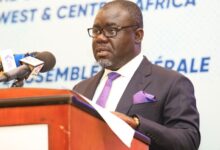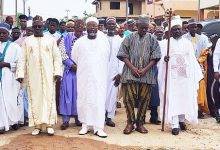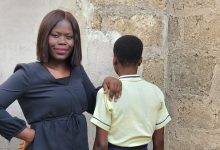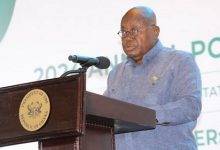The Ghana Health Service (GHS) will tomorrow begin the initial round of polio vaccination for under five children in the Northern and North East Regions.
The oral polio type 2 vaccines (OPV2) would be administered to children in six high risk districts including Chereponi, Bunkpurugu, Gushegu, Saboba, Tamale and Sangerugu of the respective regions.
The move forms part of a planned response by the GHS to control the infection following confirmation of an outbreak in Chereponi in the Northern Region and Agblogloshie in the Greater Accra Region.
Director of Public Health of the GHS, Dr Badu Sarkodie in an interview with the Ghanaian Timesyesterday, disclosed that the exercise would end on September 7, and afterwards be extended to the Accra metropolis of the Greater Accra Region.
“That will be done from September 11-14, 2019, after which we will do the round one and two vaccination in the entire North East, Northern, Savannah, Upper East and Greater Accra regions,” he said.
Dr Sarkodie added that the GHS was also looking forward to take delivery of injectable polio vaccines to complement the tablets for a nationwide vaccination “which will be done before the year ends”.
The Public Health Specialist assured that though the country had recorded isolated cases of polio recently, it would not defeat its quest to join other nations that had eradicated polio by 2020.
“Ghana has gone beyond endemicity of polio and prior to this, our last case was in 2008. This is just a one off case which was picked by our surveillance system. It must have happened because someone with the virus must have shared it through faecal matter.
This won’t take us back from the end stage of elimination, I am sure Ghana will join other countries in line to eradicate the virus,” he stated.
Giving an update on the two-year-old girl reported to have tested positive to the virus, Dr Sarkodie said her situation was stabilised and had been discharged from the hospital though undergoing physiotherapy to aid easy movement.
Expressing the GHS’s commitment to do all within its power to control the disease, the Director called for improved sanitary conditions across the country, urging parents in affected areas particularly to take their children for vaccination.
“The poor sanitary condition prevailing in our communities is what fuels the transmission of the disease when the virus is introduced to an area. We need to adhere to high standard personal hygiene and environmental sanitation.
“Authorities must provide hand washing facilities in public spaces, the schools, hospitals, public toilets etc. Government must also provide the needed resources and make funding available to address such public health issues,” he urged.
The GHS last week declared a public health emergency following the detection of polio virus type 2 in a two-year-old girl at Chereponi in the North East Region and the environment, from a drain at Agbogbloshie in the Accra metropolis of the Greater Accra Region.
Polio is an infectious disease which mainly affects young children, especially those under five years, causing muscle weakness and paralysis in about 0.5 per cent of cases reported.
It is spread from person to person mostly through faecal-oral routes, multiplies in intestines from where it subsequently invades the nervous system, causing paralysis most often in the limbs.
Symptoms of polio are fever, fatigue, headache, vomiting, neck stiffness and pains in the limbs. People living in areas with poor sanitation are at high risk of the disease.
Treatment is mainly supportive and can be prevented through vaccination, improved sanitation and personal hygiene.
BY ABIGAIL ANNOH







